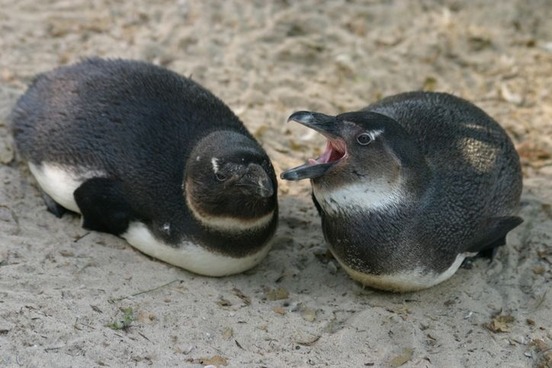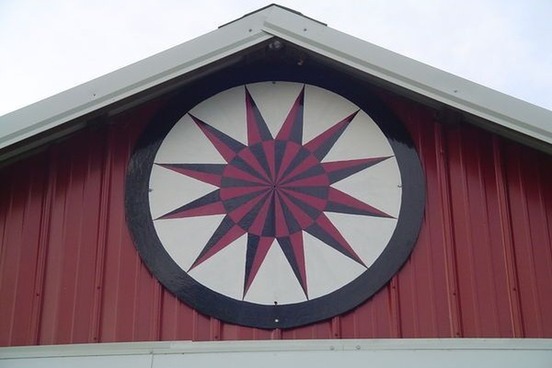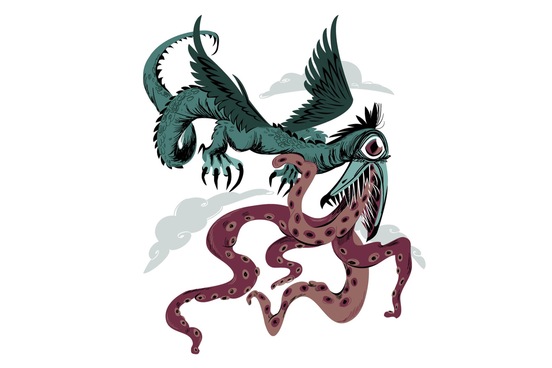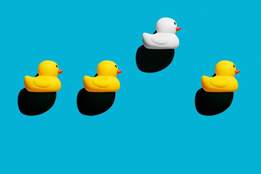
Dunk
1 : to dip or submerge temporarily in liquid 2 : to submerge oneself in water 3 : to shoot a basketball into the basket from above the rim
Dunk is the most widely used contribution Pennsylvania German (also known as Pennsylvania Dutch, with the word Dutch here being influenced by deitsch, meaning "German") has made to the English language. No one knows what we would be doing with our doughnuts and coffee, or attempting with our basketballs, if not for Pennsylvania German's perfect offering. The word traces back to an Old High German word meaning "to dip."

Grex
: to grumble or complain often shrilly or scoldingly
Grex isn't widely used, and neither is its near-twin synonym krex, and we think that's a shame. We know it's no use to grex about such things, though. Instead we'll report that grex comes from the early German krachitzen, meaning "to cry hoarsely," as krex likely does too.
: a three-toed or triangular mark put on some Pennsylvania barns to keep evil spirits from the cattle or for decoration
Hexafoos is not the plural of hexafoo. The hex part means "witch," and fuss means "foot." Our word hex, which functions as a verb meaning "to practice witchcraft" or "to affect as if by an evil spell," and as a noun meaning "spell, jinx," also comes from Pennsylvania German. The hexafoos is sometimes part of a hex mark (also called a "hex sign"), a symbolic design often with star motifs commonly placed on barns and buildings throughout Pennsylvania and especially in Berks County.
: a traditional Pennsylvania Dutch design motif in the form of a stylized bird
Distelfinks are sometimes a feature of hex marks. They're stylized goldfinches, and their name comes from the Pennsylvania German word for "goldfinch," dischdelfink. That word has two components: dischdel, meaning "thistle," and fink, meaning "finch."

Strubbly
: untidy, unkempt
Strubbly is a simpler version of the older Pennsylvania German schtruwwlich, which shares an ancient relative with the Old High German strūben, meaning "to stand on end" (it was used of hair specifically).

Funeral pie
: pie made of raisins
While raisins might seem (sorta-kinda) like dead grapes, that's not why funeral pie is called "funeral pie." The confection got its name from a Pennsylvania German custom of serving it at funerals.
: a mythical nocturnal creature that is reported chiefly from rural Maryland, is reputed to be part reptile and part bird, and is said to prey on poultry and children
Though ostensibly a resident of Maryland, the beastly-sounding snallygaster likely got its name through a modification of the Pennsylvania German schnelle geeschter, which means, literally, "quick spirits." Snallygaster is probably also the source of snollygoster, a dialect term for a shrewd, unprincipled person. The eating habits of snollygosters are not typically discussed.

Fastnacht
1 : a doughnut made of yeast-leavened dough and traditionally eaten on Shrove Tuesday 2 usually capitalized : a festival of Christians of Germanic origin held on the last day before Lent and observed as a time of merrymaking preceding Lenten fasting
Fastnacht (also spelled fasnacht) refers to both a festival held on Shrove Tuesday and to a doughnut traditionally eaten on that day. The doughnut's name is shortened from fasnachtkuche, which translates literally as "Shrove Tuesday cake." The origin of fastnacht as a term for Shrove Tuesday comes ultimately from Old High German fasta, meaning "fast," and naht, meaning "night."

Schnitz
: sliced dried fruit; especially : sliced dried apples
The most popular schnitz is apple, but schnitz (also styled as snits or snitz) can be sliced dried fruit of other varieties as well. The word schnitz is the plural of schnutz, meaning "a section of dried fruit"; schnutz is an alteration of the remarkably similar German word schnitz, meaning "slice, cut." Schnitz is also a key part of the delectable schnitz and knepp.

Panhas
: a seasoned mixture of ground meat (such as pork) and cornmeal set in a mold and served sliced and fried : scrapple
There are only so many ways to say "scrapple" in English, and Pennsylvania German has contributed very nearly all of them. There's panhas and its variants panhaus and pannhaas and pannhaus, and there's ponhaws and its variants ponhoss and ponhass and ponhaus and ponhos. The options all have their origins in old German words for "pan" and "hare."








